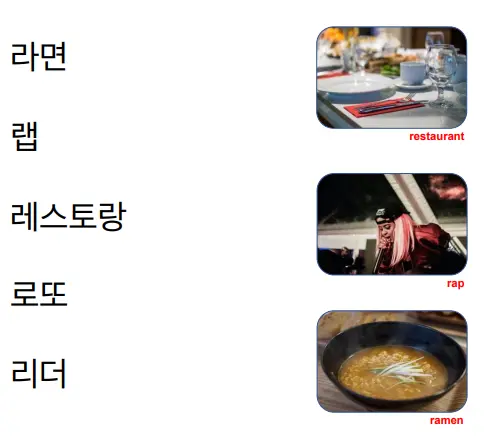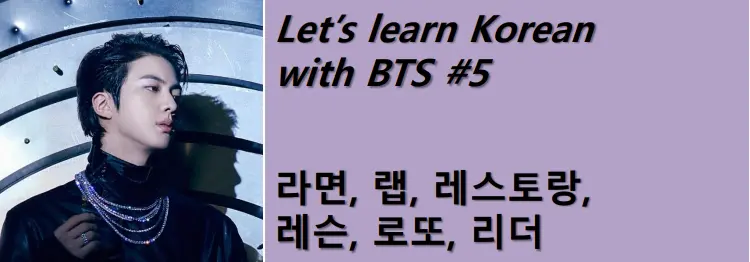Basic Korean words beginning with the consonant ㄹ([ri-eul], [l] or [r] sound)
Let’s learn Korean words 라면, 랩, 레스토랑, 레슨, 로또, 리더 with BTS lyrics.
Click on the image below to listen to all the BTS lyrics used in this post.
라면 [ra-myeon] ramen, instant noodles

ⒷⓉⓈ 라면 먹고 잔 얼굴 땡
ra-myeon meok-ggo jan eol-gul ttaeng
Face that fell asleep after eating ramen ddaeng
*라면(instant noodles) +
먹고(먹다(eat) + ~고(and)) +
잔(자다(sleep)+ㄴ(noun modifier)) +
얼굴(face) +
땡(puffy)
(*”라면 먹고 갈래요?” (“Wanna go get some ramen?”) is a popular phrase in Korea, derived from a line by the heroine of the film 봄날은 간다 (One Fine Spring Day). Similar to “Netflix and chill”, “라면 먹고 갈래요?”(“Wanna go get ramen?”) could be interpreted as a casual invitation to come over with the expectation of sexual activity.)
라면 [ra-myeon] if [*connective]

ⒷⓉⓈ 너와 나 함께라면 웃을 수 있으니까
neo-wa na ham-kke-ra-myeon u-seul su i-sseu-ni-kka
You and I, if we’re together we can smile
*너(you) + 와(and) +
나(I) +
함께(together) + ~라면(if) +
웃을 수(웃(다)(laugh) + ~을 수(dependent noun)) +
있으니까(있다(be, exist) + 으니까(because))
(*’Verb stem + ~ㄹ 수 있다’ means ‘can’ and ‘Verb stem + ~ㄹ 수 없다’ means ‘can’t’.)
랩 [raep] rap

ⒷⓉⓈ 형들의 랩 실력이 고만고만해
hyeong-deu-rui raep sil-lyeo-gi go-man-go-ma-nae
Your rap skills are back to back
*형(brothe) + 들(a plural suffix) + 의(of) +
랩(rap) +
실력(skill) + 이(subject particle) +
고만고만해(고만고만(average/just so-so) + 하다(to do, to be))
레스토랑 [re-seu-to-rang] restaurant

ⒷⓉⓈ 브로드웨이 레스토랑
beu-ro-deu-we-i re-seu-to-rang
Broadway restaurant
*브로드웨이(Broadway) +
레스토랑(restaurant)
레슨 [re-seun] lesson

ⒷⓉⓈ 그땐 저 레슨도 못 받고 있을 때에요
geu-ttaen jeo re-seun-do mot bat-ggo i-sseul ttae-e-yo
Back then, I couldn’t even get lessons
*그땐(그때(back then)+는(topic particle)) +
저 (I) +
레슨(lesson)+도(too) +
못 (not) +
받고 있을 때에요 (받다(receive) + 고 있다(present progressive) + ~ㄹ/을 때(~when) + 에요(to be))
(*나 and 저 both mean ‘I’ or ‘me’. 저 is a modest way of saying 나.
때 means time and ‘~ㄹ/을 때’ indicates a specific moment when something happens.
Sometimes 때 means dirt, dead skin.
Adding ‘~고 있다’ to a verb stem shows the action is in progress.)
로또 [ro-tto] lotto

ⒷⓉⓈ 로또라도 맞았어?
ro-tto-ra-do ma-ja-sseo?
Did you win a lottery?
*로또(lotto) + 라도(even if) +
맞았어?(맞다(win) + ~았다/었다(past tense ending)?)
(*To make a verb past tense, you must first remove 다 from the infinitive form of the verb, which gives you the verb stem. Then you must add the correct past tense ending to the verb to make it past tense.
If the last vowel in a verb stem is ㅏ or ㅗ, add 았다 or 았어 or 았어요.
If the last vowel in a verb stem is NOT ㅏ or ㅗ, add 었다 or 었어 or 었어요.
Also, if a verb ends in 하다, change the 하다 to 했다 or 했어 or 했어요 to make it past tense.)
리더 [ri-deo] leader

ⒷⓉⓈ 리더가 얼마나 고생을 많이 하는데
ri-deo-ga eol-ma-na go-saeng-eul ma-ni ha-neun-de
The leader suffers so much
*리더(leader) + 가(subject particle) +
얼마나(how much) +
고생(hard work) + 을(object particle) +
많이(a lot) +
하는데(do)
Grammar Reference
*You may have noticed that words beginning with the Korean consonant ‘ㄹ’ are often made up of loanwords.
In Korean, 두음법칙 (du-eum-beop-chik) refers to a phonological phenomenon in which the initial ‘ㄹ’ sound changes to ‘ㄴ’ in certain words. This change occurs in certain words and names, typically proper names or nouns. It’s a bit of a mouthful, so we’ll just take note of its existence and move on.
*Adjective[verb] stem + ㄴ/은/는/을 + noun : noun that adjective[verb]
ex)잔 얼굴 : 자다(sleep) + ㄴ(functions as a noun modifier) + 얼굴(face)
ㄴ/은/는/을 is added to verbs and adjectives to allow them to function as noun modifiers
*Adjective[verb] stem + ~(으)니까 : because, since
ex)있으니까 : 있다(be, exist) + 으니까(because)
*Noun + ~이/가 : noun + subject particle
ex)실력이 : 실력(skill) + 이(subject particle)
리더가 : 리더(leader) + 가(subject particle)
이 for nouns ending in a consonant, 가 for nouns ending in a vowel.
*Noun + ~와/과 : with, and
ex)너와 나 : 너(you) + 와(and) + 나(I)
과 for nouns ending in a consonant, 와 for nouns ending in a vowel.
*Noun + ~들 : a plural suffix
ex)형들 : 형(brother) + 들(a plural suffix)
*Noun + ~의 : of
ex)형들의 : 형(brother) + 들(a plural suffix) + 의(of)
*Noun+하다 : verb
ex)고만고만해 : 고만고만(average/just so-so) + 하다(to do, to be = 해)
In some cases, nouns can be turned into verbs by simply adding the verb 하다(to do, to be).
*Noun + 이에요/예요 : to be
ex)때에요 : 때(time) + 에요(to be)
It shows the state or attribute of the subject/topic of the sentence.
이에요 for noun which end with a consonant, 에요 for noun which end with a vowel.)
*못 + verb : can’t
ex)못 받고 : 못 (not) + 받고 (receive)
못/안 are used in the negative expression. 못 + verb = can’t, 안 + verb = don’t
*~다면/~(이)라면 : if (hypothetical)
ex)함께라면 : 함께(together) + ~라면(if)
Quiz. Linking words to images

BTS music video to enjoy
Well done for making it this far.
Watch the 땡 (Ddaeng) music video above and see if you can hear “라면 먹고 잔 얼굴 땡”, which you learned today.



